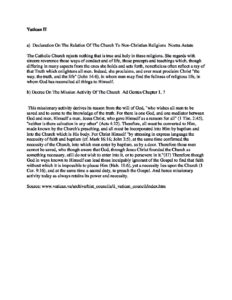a) Declaration On The Relation Of The Church To Non-Christian Religions Nostra Aetate
The Catholic Church rejects nothing that is true and holy in these religions. She regards with sincere reverence those ways of conduct and of life, those precepts and teachings which, though differing in many aspects from the ones she holds and sets forth, nonetheless often reflect a ray of that Truth which enlightens all men. Indeed, she proclaims, and ever must proclaim Christ “the way, the truth, and the life” (John 14:6), in whom men may find the fullness of religious life, in whom God has reconciled all things to Himself.
b) Decree On The Mission Activity Of The Church Ad Gentes Chapter 1, 7
This missionary activity derives its reason from the will of God, “who wishes all men to be saved and to come to the knowledge of the truth. For there is one God, and one mediator between God and men, Himself a man, Jesus Christ, who gave Himself as a ransom for all” (1 Tim. 2:45), “neither is there salvation in any other” (Acts 4:12). Therefore, all must be converted to Him, made known by the Church’s preaching, and all must be incorporated into Him by baptism and into the Church which is His body. For Christ Himself “by stressing in express language the necessity of faith and baptism (cf. Mark 16:16; John 3:5), at the same time confirmed the necessity of the Church, into which men enter by baptism, as by a door. Therefore those men cannot be saved, who though aware that God, through Jesus Christ founded the Church as something necessary, still do not wish to enter into it, or to persevere in it.”(17) Therefore though God in ways known to Himself can lead those inculpably ignorant of the Gospel to find that faith without which it is impossible to please Him (Heb. 11:6), yet a necessity lies upon the Church (1 Cor. 9:16), and at the same time a sacred duty, to preach the Gospel. And hence missionary activity today as always retains its power and necessity.
